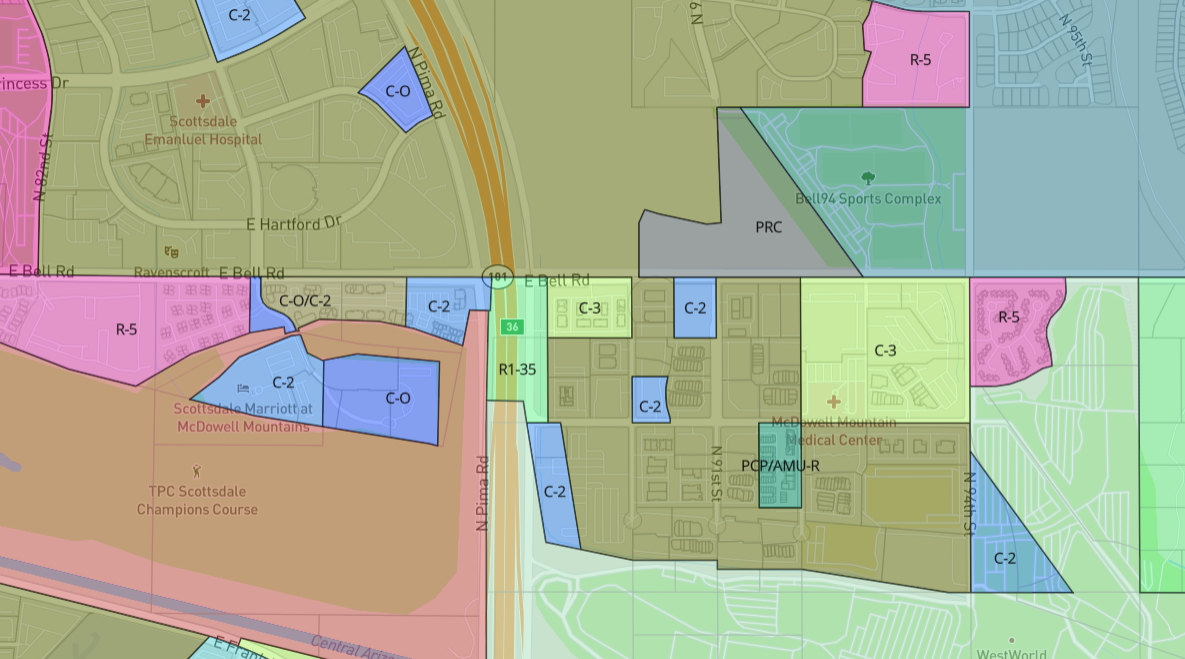Commercial Zoning: PRC, PNC & PCC

The zoning classifications PRC, PNC, and PCC refer to different zoning designations used in urban planning and land use regulation in Scottsdale, Arizona. Here’s a brief breakdown of each:
1.) PRC (Planned Regional Center):
– “This district is intended to provide for regional shopping, business, and residential uses within a planned center serving a broad region. The Planned Regional Center (PRC) development should be pedestrian oriented with complementary mixed uses that are carefully interrelated by site design.
– Minimum: Twenty-five (25) acres of gross lot area.”
Additional information regarding PNC zoning regulations can be found here.
2.) PNC (Planned Neighborhood Center):
– “This district is intended to provide a hub of activity and a focal point in the community. The center provides professional offices, services and retail sales to meet the daily needs of the residents and patrons. Residential uses are encouraged to provide a live-work atmosphere of day and nighttime activities.
Development Plan Size Requirement:
– Minimum: four (4) acres of gross lot area
– Maximum: fifteen (15) acres of gross lot area.”
Additional information regarding PNC zoning regulations can be found here.
3.) PCC (Planned Community Center):
– “This district is intended to provide a large variety of retail goods and personal and professional services for multiple neighborhoods. Residential uses are encouraged to promote day and night time activity.
Development Plan Size Requirement:
– Minimum: fifteen (15) acres of gross lot area
– Maximum: thirty (30) acres of gross lot area.”
Additional information regarding PNC zoning regulations can be found here.
Zoning plays a critical role in commercial real estate for several reasons:
1.) Land Use Regulations: Zoning regulations dictate how land and buildings can be used within a specific area. Commercial zoning designations determine where commercial activities such as retail stores, office buildings, and industrial facilities are permitted. Understanding zoning regulations is essential for developers and investors to ensure that their intended use aligns with local zoning laws.
2.) Property Values: Zoning can significantly impact property values. Properties located in areas zoned for commercial use typically command higher prices due to their potential for generating income from commercial activities. Conversely, properties located in residential or mixed-use zones may have lower values for commercial purposes.
3.) Permitted Land Uses: Zoning regulations outline the types of businesses and activities that are allowed in a particular area. For example, certain zones may permit retail stores and restaurants but prohibit industrial or manufacturing operations. Investors and tenants need to consider zoning restrictions when evaluating properties for lease or purchase to ensure that their intended use is allowed.
4.) Development Potential: Zoning regulations can influence the development potential of a property. Commercial zoning designations may allow for higher building densities, taller structures, or increased floor area ratios, enabling developers to maximize the use of the land and optimize returns on investment.
5.) Market Demand: Zoning can reflect market demand for commercial real estate in specific locations. Properties located in areas with favorable zoning designations for commercial use may attract more interest from investors, tenants, and developers, leading to increased demand and higher property values.
6.) Neighborhood Character: Zoning regulations help shape the character and appearance of neighborhoods. Commercial zoning designations aim to balance the need for commercial activities with considerations such as traffic flow, pedestrian access, and aesthetics. Zoning regulations may include requirements for building design, setbacks, landscaping, and signage to maintain the desired character of commercial areas.
Overall, zoning is a critical factor in commercial real estate that influences property values, development potential, market demand, and neighborhood character. Investors, developers, and tenants must understand zoning regulations and their implications to make informed decisions and navigate the complexities of commercial real estate transactions successfully.
Disclaimer: The information provided in this article is for educational and informational purposes only. It is not intended to be, nor should it be construed as, financial, legal, or investment advice. Readers are advised to consult with qualified professionals, such as financial advisors, attorneys, and/or real estate experts, before making any financial decisions or entering into any commercial real estate transactions. The author and publisher of this post make no representations or warranties regarding the accuracy, completeness, or suitability of the information provided herein. The use of this information is at the reader’s own risk.
The image(s) used in this article are for illustrative purposes only and are sourced from https://propzone.gridics.com. We do not own the rights to these images. All credits and copyrights belong to their respective owners.
Share This Article:


